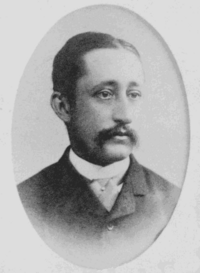John Ellard Gore facts for kids
Quick facts for kids
John Ellard Gore
|
|
|---|---|

John Ellard Gore
|
|
| Born | 1 June 1845 |
| Died | 18 July 1910 (aged 65) |
| Nationality | Irish |
| Alma mater | Trinity College, Dublin |
| Scientific career | |
| Fields | Astronomy |
John Ellard Gore (1845–1910) was an Irish astronomer. He loved studying the stars and wrote many books about them. He was also one of the people who helped start the British Astronomical Association.
John Gore was especially interested in variable stars. These are stars that change in brightness. He discovered several of these, like W Cygni and U Orionis. He also found Nova Persei, a "new" star that suddenly became very bright. To honor his work, a crater on the Moon was named after him in 2009 by the IAU.
Early Life and Education
John Gore was born in Athlone, County Westmeath, Ireland, in 1845. He was the oldest son in his family. He had three brothers and one sister.
John went to Trinity College, Dublin. In 1865, he earned a special degree. It was in Civil Engineering.
Working as an Engineer
After college, John Gore worked as a railway engineer. He worked in Ireland for more than two years. Later, he moved to India. There, he worked on a big project called the Sirhind Canal. He was an assistant engineer for the Indian Public Works Department.
In 1877, he came back to Ireland for a break. He lived in Ballysadare, County Sligo, with his father. In 1879, he decided to stop working as an engineer. He had worked for 11 years. After his father passed away in 1894, John moved to Dublin. He spent the rest of his life focusing on his passion: astronomy.
His Love for Astronomy
John Gore did not have formal training in astronomy. He started learning about the sky while he was working in India. He used his own eyes, binoculars, and small telescopes. He had a three-inch telescope and a ten-centimeter telescope.
His first book about stars was published in India in 1877. It was called "Southern Stellar Objects for Small Telescopes."
When he returned to Ireland in 1877, he continued his studies. He used a three-inch telescope and binoculars. He even set up his own observatory in Sligo. Later, he moved his observatory to Dublin. His most important work was studying double stars and variable stars. He created lists and catalogs of these stars.
John Gore passed away on July 18, 1910. He was crossing Grafton Street in Dublin when he was in an accident.
His Legacy
In 2009, a special honor was given to John Gore. The IAU named a crater after him. This crater is on the side of the Moon that faces Earth. It is located near the Moon's northern pole.

